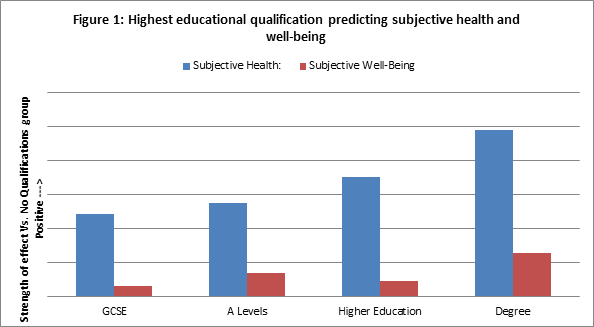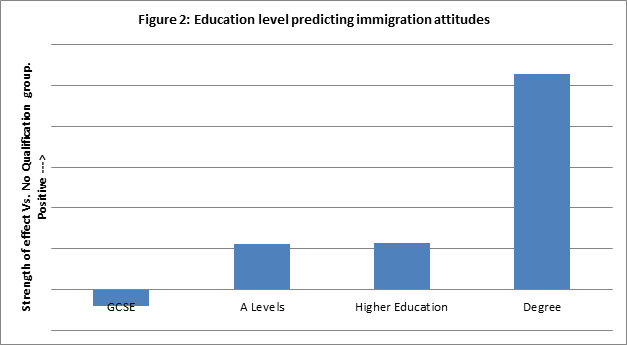Education is highly valued in contemporary Western societies, and has become a strong indicator of people’s job status, salary, socioeconomic status, and marriage partners. Those with lower levels of education therefore occupy low status positions in society and are subject to stigma within both institutional and social circles. As education is so important in today’s societies, those with low levels of education are likely to feel a decreased sense of self-worth and –esteem, which can negatively affect their well-being.
We tested this hypothesis using UK data from the British Social Attitudes, British Household Panel Survey, the Understanding Society survey, and the Citizenship survey. Our analyses indicated a clear association between education and well-being, although the relationship was much stronger for measures of subjective health than for measure of subjective well-being (Figure 1).

People are motivated to evaluate their social identities in a positive way. While this is a relatively easy task for those with high levels of education, it is, almost by definition, harder for those with low levels of education. This can invoke a range of thoughts and motivations that can lead to a diverse range of negative effects. For example, groups that occupy low status positions have been shown to derogate outgroups that hold similarly low status positions to themselves in an attempt to increase their own positivity by decreasing the positivity of a comparison group. Applying this to education, we expected that those with lower levels of education would display more negative attitudes towards immigrants (a group with comparable low status), which our analyses confirmed (Figure 2). We found similar detrimental effects associated with lower levels of education when investigating a range of variables such as level of trust in the government, trust towards people in general, perceptions of political influence, and political engagement. However, we did find that people with lower levels of education felt a greater sense of belonging to their local community, perhaps reflecting the finding that individualism is fostered by higher education. We found very similar results when investigating this internationally, using data from 36 nations who took part in the national identity theme of the International Social Survey Programme in 2003.

Overall, our results suggest that the well-being of people with low levels of education suffers from the societal stigma attached to their social position, and that this can manifest itself in a range of attitudes and beliefs which, when applied to whole groups of people, may be harmful to the welfare of societies.
A paper reporting the main results of Strand 1 was published in Social Indicators Research:
Easterbrook, M. J., Kuppens, T., & Manstead, A. S. R. (2016). The education effect: higher educational qualifications are robustly associated with beneficial personal and socio-political outcomes. Social Indicators Research, 126(3), 1261-1298. http://dx.doi.org/10.1007/s11205-015-0946-1

